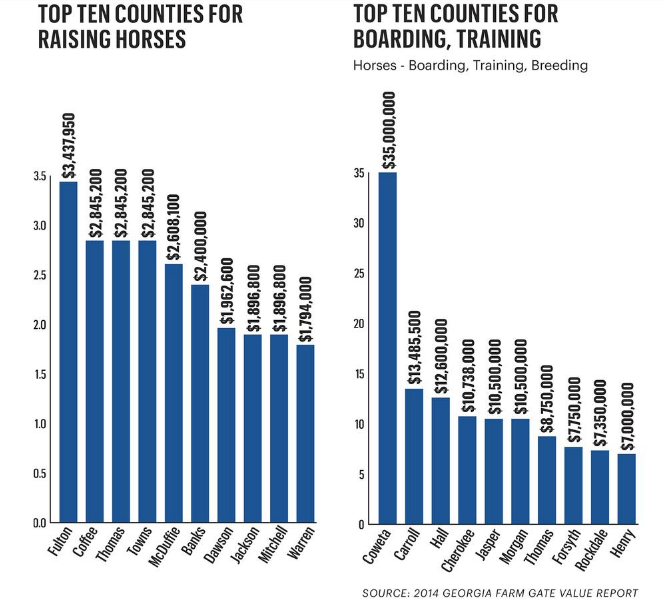When Roger Brown bought what is now one of Alpharetta’s oldest horse farms nearly 50 years ago, Atlanta wasn’t connected to the northern part of Fulton County by Georgia 400.
Today, Alpharetta has more than 65,000 residents and sees its population soar to more than 100,000 each workday as it is home to about 600 technology companies. It houses more than a quarter of the metro area’s top 25 technology employers.

Before Alpharetta became known as the “Technology City of the South,” it was known by many as Georgia’s horse capital.
“The horse people from all over the country knew Alpharetta because of horses,” said Brown, who has earned a living for the past five decades training and breeding horses, giving riding lessons, plus producing and judging horse shows. “It put Alpharetta on the map as Georgia’s horse capital.”
Georgia’s equine industry is anything but a pony show — it has a $2.5 billion annual impact on the state’s economy, according to the Georgia Agricultural Commodity Commission for Equine.
Further, horses are the No. 9 commodity in the state with a value of more than $333 million, or about $279.8 million more than those famous Georgia peaches. That’s according to the 2014 Farm Gate Value Reports from The University of Georgia, which calculates net value of a product after it leaves a farm minus marketing and/or delivery costs.
More than 173,000 Georgia households own horses, which contributes $868.7 million to the state’s economy, according to a study by The University of Georgia Center for Agribusiness and Economic Development.

While more than $750 million is generated from the breeding and care of the 74,000 horses in Georgia today, the state’s equine industry has two tales to tell — one of recreational horse owners and another of serious breeders and competitors. And the urban sprawl from Atlanta is causing new problems for many of the latter, like Brown.
“Property taxes are astronomical and we have a lot of problems with fireworks scaring the horses so lots of people are moving to areas like Conyers,” Brown said.
Though Georgia isn’t one of the leading horse producing states in pure volume, the quality of Georgia’s horses, horse trainers and horse facilities are among the best in the country. And that reputation, coupled with the fact that horse farm owners close to Atlanta are looking for new places to show their horses, has and is boding well for parks like Alpharetta’s Wills Park Equestrian Center and Conyers’ Georgia International Horse Park.
Jennifer Bexley is in her 13th year as director of the 1,400-acre Georgia International Horse Park, the setting for all equestrian events at the 1996 Centennial Olympic Games.
Bexley, who grew up on an Arabian horse farm in Conyers, said that since 2008, the park has been booked consistently during horse show season.
“There are more horses at our shows [than there were before 2008],” Bexley said. “We usually have about 60-65 equestrian events a year and that’s been pretty consistent for the last few years.”
Bexley noted the park, which can simultaneously hold multiple shows and events, recently hosted a two-week hunter-jumper show that brings people from all over the Southeast. It also hosted a regional dressage championship that attracts people from all over the region.
“Even some of our mid-size shows have grown from being local to having people coming from farther distances,” she said. While setbacks are pushing some horse farm owners out of Alpharetta and Milton, opportunities are driving some of the others to look for greener pastures elsewhere.
“Because of rising land costs north of Atlanta, many of the horse farms that used to exist are being purchased by developers and being developed out for purposes other than equine activities,” said Georgia Horse Council President Christopher Chapman, an attorney at Smith, Welch, Webb and White.
One recent example is the nearly 50-acre former equestrian estate in Milton, Ga., Bethany’s Rest, half of which was sold and converted into a women’s retreat while the other half was sold and converted into a residential neighborhood.
But Chapman said there is a “significant” trend toward the purchase of land for the revitalization of horse farms in the area between Covington and Augusta.
And it’s not all about the horse farm. There has been a recent push from the Georgia Horse Racing Coalition to bring horse racing to Georgia. The coalition says racing could bring 5,000 jobs and a $500 million economic impact.
“Georgia is a significant player in the equine industry but because Florida is friendlier towards the tracks, a lot of the horse owners will have a farm in Kentucky and a farm to winter their horses in north Florida,” he said. “Part of the thinking of bringing a track to Georgia was it would signal to the horse owners we are into supporting the industry, which could lead to the development of more horse racing farms...”
That’s in addition to a track and the other economic drivers it would bring, he said.
“Too many horse owners are coming through Georgia with their horses, when they could be coming to Georgia with their horses.”
Phil W. Hudson is a music, sports and finance reporter. Read more by him at Atlanta Business Chronicle. Click here to follow him on Twitter.

